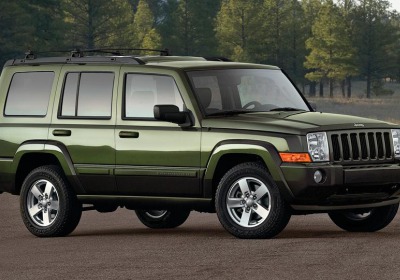Jeep Grand Cherokee, Commander 4WD problems unrelated to N23 recall, Chrysler says
Fri, 21 Feb 2014
A sizable segment of the Jeep-buying public doesn't do much off-roading, spending much more time on the commute than on the trail. If their vehicle's 4WD system didn't work, it would take a few months and a snowstorm of two for them to notice. If their low-range 4WD died, they'd probably never know it.
But when some Jeep Grand Cherokee and Commander owners -- the people who actually take their Jeeps off the pavement and into who-knows-where -- started seeing 4WD system errors, apparently after receiving recall-related updates last year, they began sounding off.
Chrysler heard their calls (and so have we), and the automaker has finally issued a statement asserting that last year's recall and its associated software update are not the cause of these 4WD woes. It's not yet clear how this development will help owners of impacted vehicles, but it's notable in that it seems to contradict the theories developed following the recall.
The statement follows, but first, a bit of background for the uninitiated on the recall and its aftermath.
Last year, Chrysler issued Safety Recall N23, covering roughly 469,000 2005-2010 Jeep Grand Cherokees and 2006-2010 Jeep Commanders. These SUVs are equipped with the NVG 245 transfer case, and their transfer-case actuator modules contain a circuit board that may develop cracks. When the circuits go bad, they can cause the vehicles to shift into neutral unexpectedly, creating the potential for rollaways.
Rather than replacing the circuit boards, Chrysler engineers devised a workaround: a software update that reprogrammed the final driver controller, installed for free at dealerships. It seemed to work, at least initially.
Except -- according to some Jeep owners -- the fix trigged its own set of problems. After receiving the software update, owners saw “4WD system error” messages and reported the loss of low-range 4WD functionality. To paraphrase one Grand Cherokee owner, “Trail Rated” had become “mall rated.” Repeat trips to dealerships for service fixed nothing. Aftermarket software seemed to solve the 4WD errors, at least temporarily, but it reintroduced the risk of neutral rollaways.
The timing of the problems seemed to suggest a connection to the recall. Some owners posited that the reflash tightened the tolerances of certain electrical signals read by the final drive control computer (you can read about how this system works in a technical paper available here), solving the neutral-shifting problem but nuking low-range 4WD.
It seemed plausible enough. But this chain of cause and effect is, according to the Chrysler Group, nonexistent. Its recent statement makes that much clear (all emphasis is ours):
“Chrysler Group is assuming the cost of repairs, on a case-by-case basis, for certain customers who observed warning lights in their instrument clusters following completion of a recall-related software update. However, the update has no bearing on the root cause of the warning-light activation.
Chrysler Group engineers developed the software update, which prevents an inadvertent transfer-case shift and also enables identification of a pre-existing electrical fault that was previously undetectable.”
Basically, if you have a Jeep Commander or Grand Cherokee that experienced error messages and/or saw a loss of some 4WD functionality after receiving the N23 software upgrade, you might be able to get it fixed at your Jeep dealer, gratis. Or you might not; we haven't seen what criteria come into play during each “case-by-case” inspection.
Either way, Chrysler is saying that the problems certain Jeeps are suffering from are not directly related to the recall-related update. Yet, the detective work done by some enthusiasts regarding increased final drive control computer sensitivity post-reflash doesn't seem to be baseless: There's that “pre-existing electrical fault that was previously undetectable” in the mix.
At this time, we don't have any details on what, exactly, that fault might be. We also haven't seen any statements that directly address what's causing some Jeep owners to see a loss of 4WD functionality. So if you own a Commander or Grand Cherokee and are having 4WD problems, there doesn't seem to be a magic-bullet fix (sorry). And in that regard, Chrysler's statement isn't going to satisfy owners fed up with a neutered SUV.
But Chrysler having clarified that the N23 recall and the associated reflash are not at the center of the matter could still be useful. It at least points owners away from a faulty, if understandable, chain of reasoning, and may mean that another trip to the dealer won't result in another round of futile reflashing.
We suspect we'll find out if this technical tidbit is helpful soon enough. If there's one thing we know about the Jeep enthusiast community, it's that they won't rest until things are set right.
We'll be sure to bring you any updates if and when they become available. In the meantime, please contact Autoweek (gkozak@autoweek.com) if you have an affected vehicle and manage to get it repaired -- or if another trip to the dealer leaves you stuck with a faulty 4WD system.
By Graham Kozak



